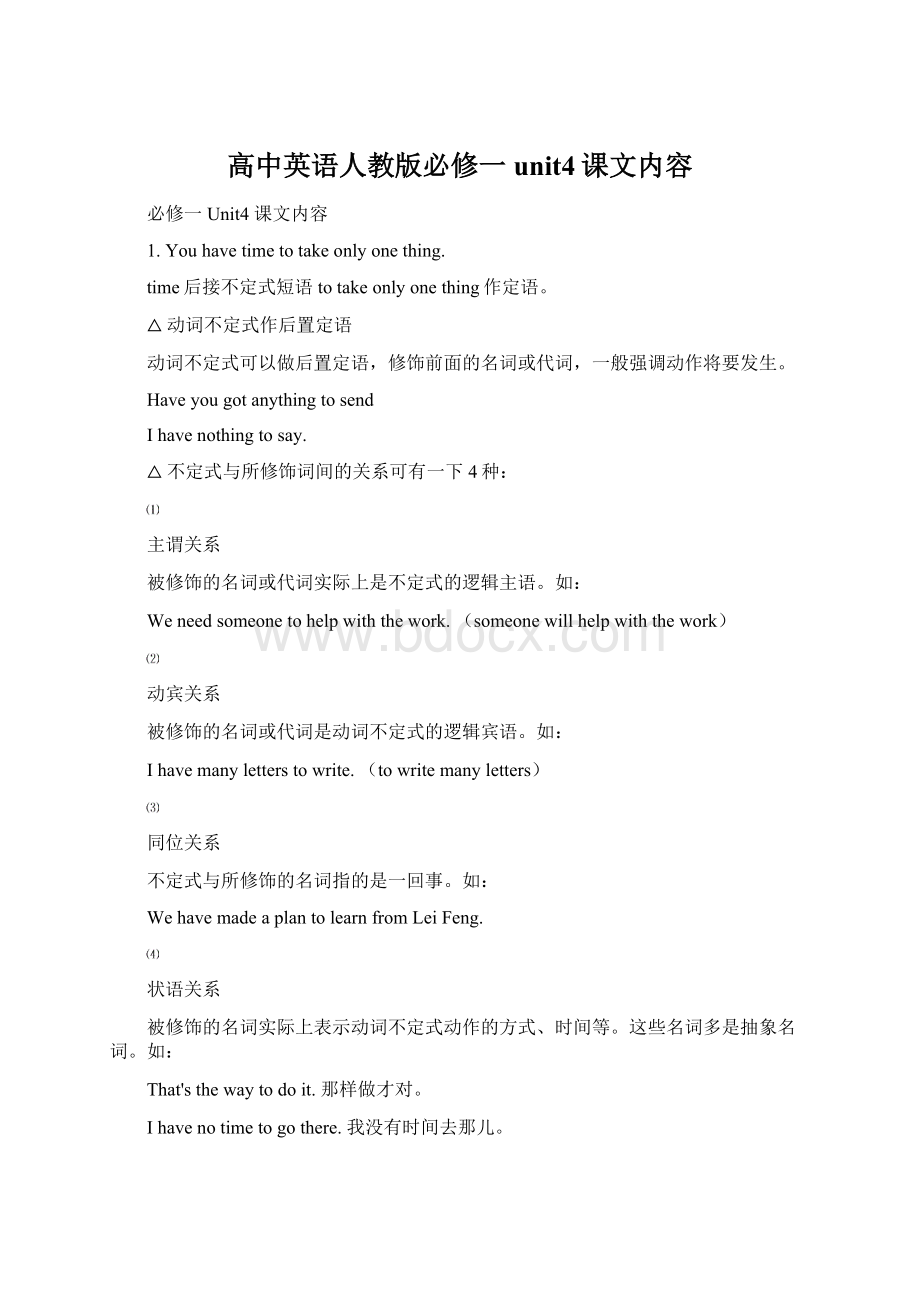高中英语人教版必修一unit4课文内容Word文档下载推荐.docx
《高中英语人教版必修一unit4课文内容Word文档下载推荐.docx》由会员分享,可在线阅读,更多相关《高中英语人教版必修一unit4课文内容Word文档下载推荐.docx(14页珍藏版)》请在冰豆网上搜索。

Pleasegivemeaknifetocutwith.
Maryhadnomoneyandnoplacetolive.
△辨析:
动名词、现在分词做定语
动名词作定语时,和它所修饰的名词之间没有逻辑上的主谓关系,只表示被修饰名词的一般用途,必须位于名词之前。
如:
There
is
a
swimming
pool
in
our
school.
现在分词作定语时,和它所修饰的名词之间有逻辑上的主谓关系,表示所修饰名词的特征,一般强调动作正在发生。
Listen
to
the
singing
bird.
Who
boy
running
towards
us。
练习:
Bird’ssingingissometimesawarningtootherbirds______away.
A.tostayB.stayingC.stayedD.stay
⑵Theability________anideaisasimportantastheideaitself.
A.expressingB.expressedC.toexpressD.tobeexpressed
2.Inthefarmyards,thechickensandeventhepigsweretoonervoustoeat.
△too...to...结构
该句型在多数情况下表示否定意义,通常为“太……而不能……,太……而无法……”。
该结构用法说明如下:
too为副词,修饰形容词或其他副词。
to为不定式符号,其后接动词原形。
Thehatistoolargetowear.
Hewalkstooslowlytogetthereontime.
不定式作结果状语,常用主动形式,其逻辑主语有时是句子的主语,有时不是,若不是,不定式的逻辑主语通常由for引出。
Thebookistoodifficultforustoread.
Shewastooshorttoreachtheapplesonthetable.
该句型可以与“so...that...”,“not...enoughto...”句型转换。
Sheistooshorttoreachthebookontheshelf.
=Sheisnottallenoughtoreachthebookontheshelf.
=Sheissoshortthatshecan’treachthebookontheshelf.
△
too...to...有时也可以表示肯定的意义:
too后跟ready,eager,willing,pleased,glad等表示心情或倾向性的形容词时
too前有only,all等副词对其进行修饰时
Heistooeagertoknowtheresultoftheexamination.
Iamonlytoogladtoacceptyourinvitation.
can/couldnot...too/enough结构常出现在情景对话中,表示“再怎样也不未过,无论怎么也不够”。
Youcannotbetoocarefulwhencrossingtheroad.
Icannotthankyouenough.
练习:
同义句转换:
Theboyistooyoungtojointhearmy.
=
Itistoocoldforthestudentstoplayontheplayground.
Theteacher’squestionwastoodifficultthatthestudentscouldn’tanswerit.
–MustIturnoffthelightsafterwork
–Ofcourse.Youcanneverbe_______carefultodothat.
A.enoughB.tooC.soD.very
3.Miceranoutofthefieldslookingforplacestohide.
△此句为简单句,该句中的lookingforplacestohide作ran的伴随状语,状语中动作lookfor与句子的谓语ran表示的动作同时发生。
△现在分词作伴随状语
现在分词表示主动,所表示的动作和谓语动词所表示的动作是同时或几乎同时发生的。
现在分词作状语,是对谓语动词所表示的动作或状态的补充说明。
现在分词作伴随状语的具体用法如下:
现在分词作伴随状语时其逻辑主语为句子的主语,且现在分词与句子的主语构成逻辑上的主谓关系。
现在分词所表示的动作是伴随着句子的谓语动词表示的动作而发生或存在的,是主语的另一个、较次要的动作。
现在分词作伴随状语,可位于句首或句末。
现在分词作伴随状语时没有相应的状语从句可以与之相互转换,但可以转换为相应的并列句。
HesatatthetablereadingChinaDaily.
Shecameintothehouse,carryingalotofbooks.(=Shecameintothehouse,andcarriedalotofbooks.)
Helayonthegrass,staringattheskyforalongtime.(=Helayonthegrass,andstaredattheskyforalongtime.)
用括号内动词的适当形式填空
Thesunlightiswhiteandblinding,_______(throw)shadowsontheground.
Doyouwakeupeverymorning_______(feel)energeticandreadytostartanewday
4.Itseemedasiftheworldwasatanend!
本句为主从复合句,其中asif引导的表语从句,该从句用了陈述语气。
△asif引导从句的用法
asif意为“似乎,好像”,可以引导方式状语从句与表语从句。
其意义和用法与asthough相同。
引导表语从句,常置于系动词look,seem,sound等之后。
Shelooksasthough/ifsheweretenyearsyounger.
引导方式状语从句,用来修饰主句的谓语。
Thechildtalkstousasthough/ifhewereagrown-up.
asthough/if引导的从句有时用省略形式,asthough/if后面可接形容词、副词、不定式、名词、分词、或介词短语等。
Heactedasthough/if(hewere)afool.
Tomraisedhishandasthough/if(heweregoing)tosaysomething.
asthough/if从句的语气:
如果从句所表示的情况有明显的依据或实现的可能性较大,那么从句就用陈述语气;
如果从句所表示的情况没有依据,只是表达一种假设、愿望、怀疑或推测,那么就用虚拟语气,用法如下:
“asif/though+从句”
表示虚拟的情况
虚拟情况
从句时态
与现在事实相反
一般过去时态
与过去事实相反
过去完成时态
与将来事实相反
Should/would/might/could+动词原形
Youtreatthemasif/thoughtheywereyourparents.
Hekeptworkingasthough/ifnothinghadhappened.
Itlooksasthough/ifitisgoingtosnow.
用括号内词的适当形式填空
Elizarememberseverythingasifit______(happen)yesterday.
Hetalkedaboutthebookasthoughhe______(read)it.Infact,hedidn’treadit.
Theskylookssodarkthatitlooksasthoughit_________.
5.
One-thirdofthenationfeltit.
Allofthecity’shospitals,75%ofitsfactoriesandbuildingsand90%ofitshomesweregone.
△“分数/百分数+of+名词”作主语时的主谓一致问题
“分数/百分数+of+名词”作主语时,谓语动词的单复数由of后面的名词的单复数来决定。
Aboutonethirdofthebooksareworthreading.
Only60percentoftheworkwasdoneyesterday.
About20percentofthestudentsareabsenttoday.
△“someof,plentyof,alotof,mostof,therestof,allof,halfof,partof,themajorityof...+名词”作主语时,谓语动词的单复数由of后接的名词决定。
Therestofthemoneybelongstoyou.
Therestofthestudentsarepraised.
Alotofstudentsarewaitingimpatientlyoutside.
Alotofmoneyhasbeenwastedfornoreason.
分数的表达法:
分子在前,分母在后;
分子用基数词,分母用序数词。
分子是2或大于2时,分母用复数形式。
onefourththreefifthstwothirdstwoandthreefifths
百分数的表达法:
百分数是有基数词和百分号或percent构成的
thirty-fivepercent
One-thirdofthecountry______coveredwithtreesandthemajorityofthecitizens______blackpeople.
A,is;
areB.is;
isC.are;
areD.are;
is
Thefactoryused65percentoftherawmaterials,therestofwhich______savedforotherpurposes.
A.isB.areC.wasD.were
6.Thousandsoffamilieswerekilledandmanychildrenwereleftwithoutparents.
本句是and连接的并列句,manychildrenwereleftwithoutparents是leftmanychildrenwithoutparents的被动形式。
withoutparents为介宾短语,在句中充当主语补足语,表示主语所处的状态。
△“leave+宾语+宾补”结构
在该结构中leave表示“使处于……状态”,其后通常接复合宾语,其中宾补可由名词、形容词、副词、现在分词、介宾短语等充当。
其常见结构如下:
leave+宾语+形容词/副词/介词短语
Don’sleavethedooropen.
Hehurriedhome,leavinghiskeysintheoffice.
leave+宾语+现在分词,表示使某人或某物一直做某事。
其中宾语与构成宾补的动词之间形成逻辑上的主谓关系。
Don’tleavemewaitingoutsidetoolong.
leave+宾语+过去分词,表示宾语所处的状态或动作已经完成。
其中宾语与构成宾补的动词之间形成逻辑上的动宾关系。
Thebadweatherlefttheprojecthalffinished.
leave+宾语+名词
Hisparentsdied,leavinghimanorphan.
用leave的相关结构完成句子。
工作不要半途而废。
Don’t_________________________________________________________________.
他直接上床睡觉了,没有关电视。
Hewenttobedstraight,___________________________________________________.
7.Then,laterthatafternoon,anotherbigquakewhichwasalmostasstrongasthefirstoneshookTangshan.
本句为主从复合句,定语从句whichwasalmostasstrongasthefirstone修饰先行词anotherbigquake。
本句中的asstrongas属于“as...as”结构。
△“as...as”结构
as...as结构表示同级比较,意为“和……一样”,其中第一个as是副词,第二个as是连词。
as...as结构可用于肯定句或否定句中,该结构用于否定句时可与“so...as”结构互换。
as...as结构的几种形式:
as+adj./adv.(原级)+as
as+adj.+a/an+单数可数名词+as
asmany+可数名词复数+as
asmuch+不可数名词+as
Hedoesn’tplaythepianoso/aswellashiseldersister.
Hisbedroomisasneatashiseldersister’s.
Heisashonestamanasyou.
You’vemadeasmanymistakesasIhave.
Icancarryasmuchpaperasyoucan.
△as(so)...as结构有时可采用省略形式,即保留as(so)...,把后面的as以及其后的成分一同省略。
Thepianointhatshopwillbecheaper,butnotas/sogood(asthepianosinthisshop).
△as...as结构若有表示倍数的修饰词twice,half等,需要把修饰的词置于第一个as前面
→“倍数表达法”,用法如下:
A+谓语动词+倍数+as+adj./adv.+as+B
Thetreeistwiceastallasthehouse.
Herunsthreetimesasfastasher.他跑步是她的3倍快。
Thisrestaurantwasn’t______thatotherrestaurantwewentto.
A.halfasgoodasB.ashalfgoodas
C.asgoodashalfD.goodashalfas
Exerciseis______asanyothertoloseweight.
A.sousefulawayB.asausefulway
C.asusefulawayD.suchausefulway
用as...as结构完成句子
第一课与第二课一样容易。
_______________________________________________________________________
Jack与Kate一样努力学习。
我很少看到妈妈像现在这样对我的进步这么满意。
8.Allhopewasnotlost.
△部分否定
表示部分否定时,用否定副词not与表示整体或全部意义的词every,everyone,everybody,everything,both,all连用,意为“并不都是;
不全是”。
Notbothofhissistersagreetohissuggestion.
Itistruethatheisrich,buthemustknowmoneyisnoteverything.
Allbamboodoesn’tgrowwell.=Notallbamboogrowstall.
Bothofthemhaven’treadthisstory.=Notbothofthemhavereadthisstory.
Everymanisnothonest.=Noteverymanishonest.
全部否定的表达方式:
表示全部否定意义的词(no,none,nobody,nothing,neither,either等)+表示肯定意义的谓语。
NoneofthemwillattendthemeetingtobeheldthisSunday.
Noneofthesethingsaremine.
表示肯定意义的词变为全部否定的情况:
all→noneboth→neitherevery→no
everybody→nobodyeveryone→nooneeverything→nothing
everywhere→nowhere
It’saneither-ofsituation–wecanbuyanewcarthisyearorwecangoonaholidaybutwecan’tdo________.
A.othersB.eitherC.anotherD.both
9.Herearemyneighbourswhosehomewasdestroyedbytheearthquake.
本句是一个复合句。
Here位于句首,句子使用了全部倒装,即把谓语are放在主语myneighbours前面。
whose引导定语从句,修饰先行词myneighbours.
△here,there等副词位于句首引起的全部倒装
here,there,out,up等表示方向或方位的副词位于句首时,句子要用全部倒装。
全部倒装是指将全部谓语提至主语前面。
此种情况中谓语动词常为表示位置移动的动词且主语为名词。
Hereisyourletter.
Theregoesthebell.
Outrushedaboy.
△上述情况中,当主语时名词时用全部倒装;
当主语是代词时,则部分不倒装。
Herehecomes.
Hereyouare.
△归纳总结:
表示地点的介词短语与上述副词一样,位于句首时,句子使用全部倒装。
表地点的介词短语位于句首是为了强调地点概念。
这时谓语动词通常为be,stand,lie,come,walk,sit等。
Inthedistanceliesacar.
Insidetheparcelwasaletter.
Inthefrontofthelecturehallsitsaprofessor.
Up______intotheair.Thenthecrowdcheeredup.
A.gotheballoonsB.did